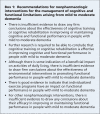Diagnosis and treatment of dementia: 5. Nonpharmacologic and pharmacologic therapy for mild to moderate dementia
- PMID: 18981443
- PMCID: PMC2572644
- DOI: 10.1503/cmaj.081103
Diagnosis and treatment of dementia: 5. Nonpharmacologic and pharmacologic therapy for mild to moderate dementia
Abstract
Background: Practising physicians frequently seek advice on the most effective interventions for dementia. In this article, we provide practical guidance on nonpharmacologic and pharmacologic interventions for the management of mild to moderate dementia based on recommendations from the Third Canadian Consensus Conference on the Diagnosis and Treatment of Dementia.
Methods: We developed evidence-based guidelines using systematic literature searches, with specific criteria for the selection and quality assessment of articles, and a clear and transparent decision-making process. We selected articles published from January 1996 to December 2005 that dealt with the management of mild to moderate stages of Alzheimer disease and other forms of dementia. Recommendations based on the literature review were drafted and voted on. Consensus required 80% or more agreement by participants. Subsequent to the conference, we searched for additional articles published from January 2006 to April 2008 using the same major keywords and secondary search terms. We graded the strength of the evidence using the criteria of the Canadian Task Force on Preventive Health Care.
Results: We identified 1615 articles, of which 954 were selected for further study. From a synthesis of the evidence in these studies, we made 48 recommendations for the management of mild to moderate dementia (28) and dementia with a cerebrovascular component (8) as well as recommendations for addressing ethical issues (e.g., disclosure of the diagnosis) (12). The updated literature review did not change these recommendations. An exercise program is recommended for patients with mild to moderate dementia. Physicians should decide whether to prescribe a cholinesterase inhibitor on an individual basis, balancing anticipated benefits with the potential for harm. For mild mood and behavioural concerns, nonpharmacologic approaches should be considered first.
Interpretation: Although the available therapies for dementia can help with the management of symptoms, there is a need to develop more effective interventions.
References
-
- Sitzer DI, Twamley EW, Jeste DV. Cognitive training in Alzheimer's disease: a meta-analysis of the literature. Acta Psychiatr Scand 2006;114:75-90. - PubMed
-
- Heyn P, Abreu BC, Ottenbacher KJ. The effects of exercise training on elderly persons with cognitive impairment and dementia: a meta-analysis. Arch Phys Med Rehabil 2004;85:1694-704. - PubMed
-
- Rolland Y, Pillard F, Klapouszczak A, et al. Exercise program for nursing home residents with Alzheimer's disease: a 1-year randomized, controlled trial. J Am Geriatr Soc 2007;55:158-65. - PubMed
Publication types
MeSH terms
Substances
LinkOut - more resources
Full Text Sources
Other Literature Sources
Medical
Miscellaneous

